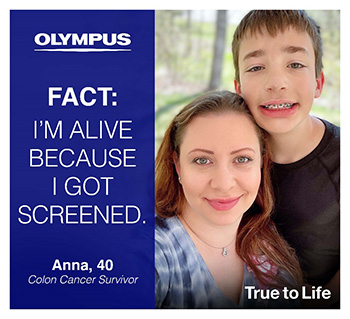Colorectal Cancer Awareness Month serves as a reminder of the importance of preventative screenings, the screening options available and the need to address health disparities

Anna Dahlgren was diagnosed with colon cancer when she was 33. She is a survivor and now serves as a colorectal cancer awareness advocate.
CENTER VALLEY, Pa. (March 8, 2022) - Olympus, a global technology leader in endoscopy, offers a reminder about the importance of screening for colorectal cancer, which may be preventable and treatable when found early.
March marks Colorectal Cancer Awareness Month, and Olympus encourages people to talk to their doctors about getting screened. The United States Preventive Services Task Force last year lowered the recommended age for colorectal cancer screenings for adults from 50 to 45.1 The Multi-Society Taskforce, which includes the American College of Gastroenterology (ACG), the American Gastroenterological Association (AGA), and the American Society for Gastrointestinal Endoscopy (ASGE), announced its full support of the new recommendation.2
Lowering the recommended screening age will allow more people to be screened, especially those among whom colorectal cancer rates are increasing most quickly.
While the overall death rate has continued to drop, deaths from colorectal cancer among those under the age of 55 had increased 1% a year from 2008 through 2017.3But the American Cancer Society reports there are now more than 1.5 million colorectal cancer survivors in the U.S. thanks, in part, to screenings that allow gastroenterologists to discover and remove polyps before they can become cancerous or cancers being found earlier when they are easier to treat.3
“The importance of colorectal cancer screenings and being aware of your family health history can’t be overstated. CRC is preventable with regular, preventative screenings and knowing whether you are at-risk is key to managing your health,” said Dr. Yolanda Scarlett, assistant professor of medicine and medical director of the GI Motility Laboratory at the Univ. of North Carolina School of Medicine. “We must also continue to address medical disparities across both racial and geographic lines and highlight the crucial role of primary care physicians, who typically prescribe colorectal cancer screening once a patient is of screening age.”
Between 2014-2018, Native Americans and Alaska Natives accounted for 49 cases of colorectal cancer per 100,000 cases and African Americans accounted for nearly 43 cases of colorectal cancer per 100,000 cases, the two highest rates among all groups.2Between 2015-2019, African Americans accounted for 18 deaths from colorectal cancer per 100,000 cases and Native Americans and Alaska Natives accounted for 17 deaths per 100,000 cases, also the two highest rates among all groups.2
Colorectal cancer impacts both men and women and is the second leading cause of cancer-related deaths among men and women combined behind lung cancer.4 The five-year survival rate is about 90% when the cancer is found at any early stage.2 Considered the most effective screening option for colon cancer, colonoscopy often gives physicians the opportunity to detect and remove precancerous polyps during screening, potentially before they become malignant.
Other colorectal cancer screening tests are also available, including fecal immunochemical test (FIT), which checks for hidden blood in the stool from the lower intestines. Such a test must be done every year, and a colonoscopy will be necessary if the test returns abnormal results.
“The best test to screen for colon cancer is the one someone is able and willing to take,” said Ross D. Segan, Chief Medical Officer, Olympus Corporation. “While colonoscopy remains the gold standard, the procedure may not be readily available to everyone. What’s most important is preventative screenings in whichever form is best for the individual. Please speak with your healthcare provider to identify your options and find the screening that’s best for you.”
Olympus understands the importance of colon cancer awareness and as such supports major national colorectal cancer organizations and initiatives as part of National Colorectal Cancer Awareness Month, including:
- Colorectal Cancer Alliance - A national campaign to raise awareness about the new screening age recommendation and address health equity.
- Colon Cancer Coalition - National presenting sponsor of “Tour de Tush” and a start/finish line sponsor of “Get Your Rear in Gear.”
- Bradbury Sullivan LGBT Community Center - Funding provides a colorectal cancer awareness campaign aimed at the LGBTQ+ community to raise awareness and address healthcare disparities.
- Remote Area Medical (RAM) - Funding to implement a colon cancer program in which select RAM pop-up clinics are outfitted with FIT tests to distribute to patients who are at risk.
- “Bum Run Toronto” kick butt sponsor.
- Continuing patient education outreach via updates to colonoscopytoday.com and truetolife.com/blog.
# # #
About Olympus
Olympus is passionate about creating customer-driven solutions for the medical, life sciences, and industrial equipment industries. For more than 100 years, Olympus has focused on making people’s lives healthier, safer and more fulfilling by helping to detect, prevent, and treat disease; furthering scientific research; and ensuring public safety. Olympus is headquartered in Tokyo, Japan, with more than 35,000 employees worldwide in nearly 40 countries and regions.
Olympus Corporation of the Americas, a wholly owned subsidiary of Olympus Corporation, is headquartered in Center Valley, Pennsylvania, USA, and employs more than 5,500 employees throughout locations in North and South America. For more information, visit https://olympusamerica.com.
- U.S. Preventive Services Task Force, “Final Recommendation Statement, Colorectal Cancer: Screening.” May 18, 2021. Accessed Feb. 14, 2022. https://www.uspreventiveservicestaskforce.org/uspstf/recommendation/colorectal-cancer-screening
- “GI Societies Support Starting Colorectal Cancer Screening From 45.” American Society for Gastrointestinal Endoscopy. https://www.asge.org/home/about-asge/newsroom/news-list/2021/05/18/gi-societies-support-starting-crc-screening-from-45. May 18, 2021
- American Cancer Society, “Cancer A to Z: Key Statistics for Colorectal Cancer” Updated Jan. 12, 2022. Accessed Feb. 14, 2022. https://www.cancer.org/cancer/colon-rectal-cancer/about/key-statistics.html
- Centers for Disease Control and Prevention, “An Update on Cancer Deaths in the United States.” Updated Feb. 28, 2022. Accessed Feb. 28, 2022 https://cdc.gov/cancer/dcpc/research/update-on-cancer-deaths

